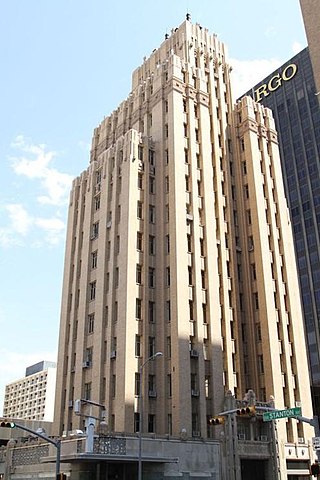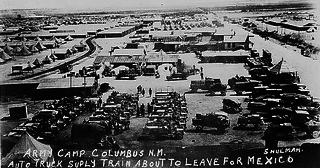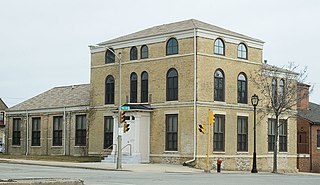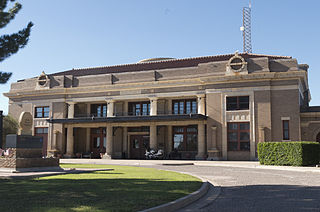
Elephant Butte Dam or Elephant Butte Dike, originally Engle Dam, is a concrete gravity dam on the Rio Grande near Truth or Consequences, New Mexico, in the United States. The dam impounds Elephant Butte Reservoir, which is used mainly for agriculture but also provides for recreation, hydroelectricity, and flood and sediment control. The construction of the dam has reduced the flow of the Rio Grande to a small stream for most of the year, with water being released only during the summer irrigation season or during times of exceptionally heavy snow melt.

The O. T. Bassett Tower is an Art Deco skyscraper located at 303 Texas Avenue in Downtown El Paso, Texas. It was built by Charles N. Bassett, who named it in honor of his father. The tower was designed by Trost & Trost and completed in 1930, making it one of Henry Trost's last commissions. It was briefly the tallest building in the city but was surpassed later the same year by the Hilton Hotel. The Bassett Tower is 217 feet tall and has 15 stories, with setbacks at the tenth and thirteenth floors. It is faced with tan brick veneer and adorned with stone and terra cotta decorative elements, including a sculpted face over the main entrance which is believed to be that of Trost himself.

The Plaza Hotel, formerly the Hilton Hotel, is a landmark skyscraper located at 106 Mills Avenue in El Paso, Texas, USA.

The El Tovar Hotel, also known simply as El Tovar, is a former Harvey House hotel situated directly on the south rim of the Grand Canyon in Grand Canyon National Park, Arizona, United States.

Little Rock Union Station, also known as Mopac Station, is a train station in Little Rock, Arkansas, United States served by Amtrak, the national railroad passenger system.

Grand Canyon Depot, also known as Grand Canyon Railroad Station, was constructed in 1909–10 for the Atchison, Topeka and Santa Fe Railway at the South Rim of the Grand Canyon, in what is now Grand Canyon National Park. It is one of three remaining railroad depots in the United States built with logs as the primary structural material. The station is within 330 feet (100 m) of the rim of the canyon, opposite the El Tovar Hotel, also built by the railroad. The depot is designated a National Historic Landmark, is listed the National Register of Historic Places, and is included in the Grand Canyon Village National Historic Landmark District.

Cripple Creek Historic District is a historic district including Cripple Creek, Colorado, United States and is significant for its gold mining era history. It developed as a gold mining center beginning in 1890, with a number of buildings from that period surviving to this day. A majority of the business district as it exists today was rebuilt after two devastating fires in April 1896. The mines in the area were among the most successful, producing millions of dollars of gold in the 1890s and supporting a population of 25,000 at its peak. It was declared a National Historic Landmark in 1961.

The Village of Columbus and Camp Furlong is a National Historic Landmark District commemorating the 1916 raid by Pancho Villa on the town of Columbus, New Mexico, and the American military response to that raid, the "Punitive Expedition" led by General John J. Pershing. The raid and its response, set during World War I, the Mexican Revolution, and an accompanying low-level Border War, played a significant role in diplomacy and military preparedness for eventual American entry in the World War. The district encompasses buildings that survived the raid, and military facilities used in the American response. The landmark designation was made in 1975.
The El Paso and Southwestern Railroad began in 1888 as the Arizona and South Eastern Railroad, a short line serving copper mines in southern Arizona. Over the next few decades, it grew into a 1200-mile system that stretched from Tucumcari, New Mexico, southward to El Paso, Texas, and westward to Tucson, Arizona, with several branch lines, including one to Nacozari, Mexico. The railroad was bought by the Southern Pacific Railroad in 1924 and fully merged into its parent company in 1955. The EP&SW was a major link in the transcontinental route of the Golden State Limited.

This is a list of the National Register of Historic Places listings in Cochise County, Arizona. It is intended to be a complete list of the properties and districts on the National Register of Historic Places in Cochise County, Arizona, United States. The locations of National Register properties and districts for which the latitude and longitude coordinates are included below, may be seen in a map.

This is a list of the National Register of Historic Places listings in El Paso County, Colorado.

The Baasen House-German YMCA in Milwaukee, Wisconsin dates from 1874. It was added to the National Register of Historic Places in 1984.

The YMCA Building was a historic building located in Council Bluffs, Iowa, United States. Construction of the building was partially funded by railroad magnate Grenville M. Dodge. The front section, designed by local architect Frederic E. Cox, was completed in 1909. The pool/gymnasium addition in the rear of the building was designed by J. Chris Jensen, another local architect, and completed in 1931. The front section is four stories tall and exhibits elements of the Colonial Revival and Federal styles. The fourth floor was renovated in 1931 and the shed dormers may have been added at that time. The rear addition is architecturally sympathetic to the original section of the building. The Union Pacific Railroad bought the building in 1929 so the facilities would be available for the men who worked on the railroad during the Great Depression. The local YMCA took over ownership again in 1955. The building was listed on the National Register of Historic Places in 1979.

The Richard Caples Building is a historic seven-story building in El Paso, Texas. It was built as a five-story for Richard Caples in 1910, and it was "the first reinforced concrete structure erected in El Paso." The fifth floor was leased to the Y.M.C.A. In 1915, the building was purchased by J.G. McGrady, who leased the basement and the first floor to F. W. Woolworth Company. Two years later, he built two more storys; they were designed by Trost & Trost. The building has been listed on the National Register of Historic Places since September 24, 1980.

J. J. Newberry Company is a historic five-story building in El Paso, Texas, United States. It was built by the J. Calisher Realty Company in 1911, and it was known as Calisher's. The Calisher company was a store first opened in El Paso in 1881. Early tenants included the YMCA and the Border National Bank. It was later renamed for the J.J. Newberry, a five and dime store chain. The building was designed in the Chicago School architectural style by Trost & Trost. It has been listed on the National Register of Historic Places since September 24, 1980.

The El Paso and Southwestern Railroad Depot is a historic building in Tucson, Arizona. It was designed in the Classical Revival style, and built in 1912 by the Phelps-Dodge Corporation. It was used as a railroad depot until 1924. In 1978, it was remodelled as a restaurant. It has been listed on the National Register of Historic Places since March 12, 2004.

The Douglas Sonoran Historic District, called the Sonoran District, is an historic district located in Douglas, Arizona. It is southwest of the business district, its rough boundaries are H Avenue on the west, from 6th to 9th Street, consisting of contiguous flush-fronted, single story, Sonoran tradition row buildings built between 1901 and 1935. The majority of the buildings were constructed using local gypsum-cast stone. This is the largest number of cast-stone buildings in the state. The District includes twenty-one buildings, of which seventeen are contributing structures.

The El Paso and Southwestern Railroad Depot is a Beaux Arts building constructed in 1913 in Douglas, Arizona. Two-stories tall, it was a major station on the El Paso and Southwestern Railroad line. It is slightly to the northwest of the Douglas Historic District, sitting on a 3.2331 acre parcel. Its grounds include fountains and a period taxi stand.



















